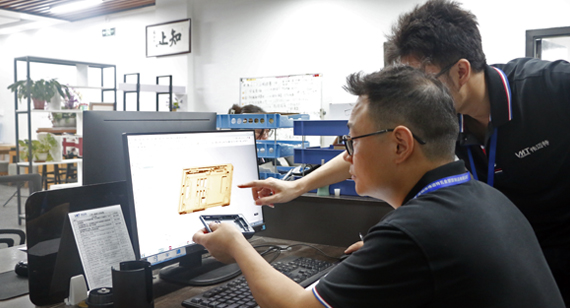15 years one-stop China custom CNC machining parts factory

Hey there I’m VMT Sam!
With 25 years of CNC machining experience we are committed to helping clients overcome 10000 complex part-processing challenges all to contribute to a better life through intelligent manufacturing. Contact us now
 111 |
Published by VMT at Mar 11 2024
111 |
Published by VMT at Mar 11 2024
Integrating CNC Machined Parts Lead Time with Production Planning
In the realm of CNC machined parts manufacturing, the accuracy of lead times is closely tied to the rationality of production planning. The lead time of CNC machined parts not only affects customer satisfaction and supply chain efficiency but is also a core element in the operational management of CNC machining factories. Therefore, combining the lead time of CNC machined parts with production planning is crucial for ensuring smooth production, enhancing customer satisfaction, and strengthening competitiveness.

I. Understanding the Significance of CNC Machined Parts Lead Time
The lead time of CNC machined parts refers to the total time required from receiving an order to completing machining, inspection, packaging, and delivery to the customer. The accuracy of lead times is critical for CNC machining factories as it directly relates to the factory's reputation, maintaining customer relationships, and the overall efficiency of the supply chain. Delayed lead times may lead to customer dissatisfaction, contract breaches, and even more severe consequences such as customer loss and a decline in market share.

II. The Role of Production Planning in CNC Machining Factories
Production planning is the core of management in CNC machining factories. It involves the rational allocation of production resources, task scheduling, and monitoring of production progress. A sound production plan ensures that each stage of the production process is closely linked, improving production efficiency and reducing resource wastage. Additionally, a production plan provides clear production goals and directions, contributing to the long-term stability and development of the factory.
III. Strategies for Integrating CNC Machined Parts Lead Time with Production Planning
Demand Analysis and Order Review
Conduct a detailed analysis of customer requirements upon receiving an order, including part types, quantities, quality requirements, and delivery deadlines.
Through order reviews, evaluate the factory's production capacity and resource situation, ensuring the timely delivery of high-quality products.

Formulate Production Plans
Based on the results of order reviews, create detailed production plans that include specific production tasks, sequences, times, and required resources.
Consider uncertainties in the production process, such as equipment failures or raw material supply issues, and develop corresponding contingency measures.
Lead Time Management and Monitoring
Strictly manage and monitor the lead time of CNC machined parts during the production process.
Ensure accurate lead times by regularly checking and reporting production progress. If delays or potential risks are identified, adjust the production plan promptly and take effective measures to ensure lead time accuracy.
Communication and Coordination
Maintain close communication with customers to provide timely updates on production progress and address any potential issues.
Strengthen internal communication and collaboration among different departments within the factory to ensure information flow and resource sharing during the production process.

IV. Lead Time and Production Planning in Custom CNC Machining
Custom CNC machining, involving personalized customer requirements, imposes higher demands on the integration of lead time and production planning. In custom CNC machining, the factory should:
Develop specialized production plans based on specific customer requirements to ensure smooth coordination at every stage of the production process.
Strengthen communication and collaboration with customers, adjusting production plans promptly to meet customer expectations.
V. Optimization Strategies and Recommendations
To better integrate the lead time of CNC machined parts with production planning, factories can adopt the following optimization strategies and recommendations:
Introduce advanced production management systems to improve the efficiency of production plan formulation and execution.
Enhance employee training and skill development to improve production efficiency and product quality.
Optimize supply chain management to ensure the steady supply and reliable quality of raw materials.
Establish a comprehensive lead time management mechanism, strengthen lead time monitoring, and implement early warning systems.
Strengthen communication and collaboration with customers, establishing long-term stable cooperative relationships.
VI. Conclusion and Outlook
Integrating the lead time of CNC machined parts with production planning is crucial for CNC machining factories to improve production efficiency, customer satisfaction, and overall competitiveness. Through understanding the significance of lead times, formulating rational production plans, managing and monitoring lead times effectively, and optimizing supply chain management, factories can ensure smooth production processes and lead time accuracy. In the future, with the continuous improvement of CNC machining technology and production management capabilities, the integration of lead times and production planning for CNC machined parts will become even more seamless and efficient, providing robust support for the sustained development of the CNC machining industry.
Ready To Start Your Next Project?
Get Instant Quote

Request a Free Quote
Send us a message if you have any questions or request a quote. We will get back to you ASAP!